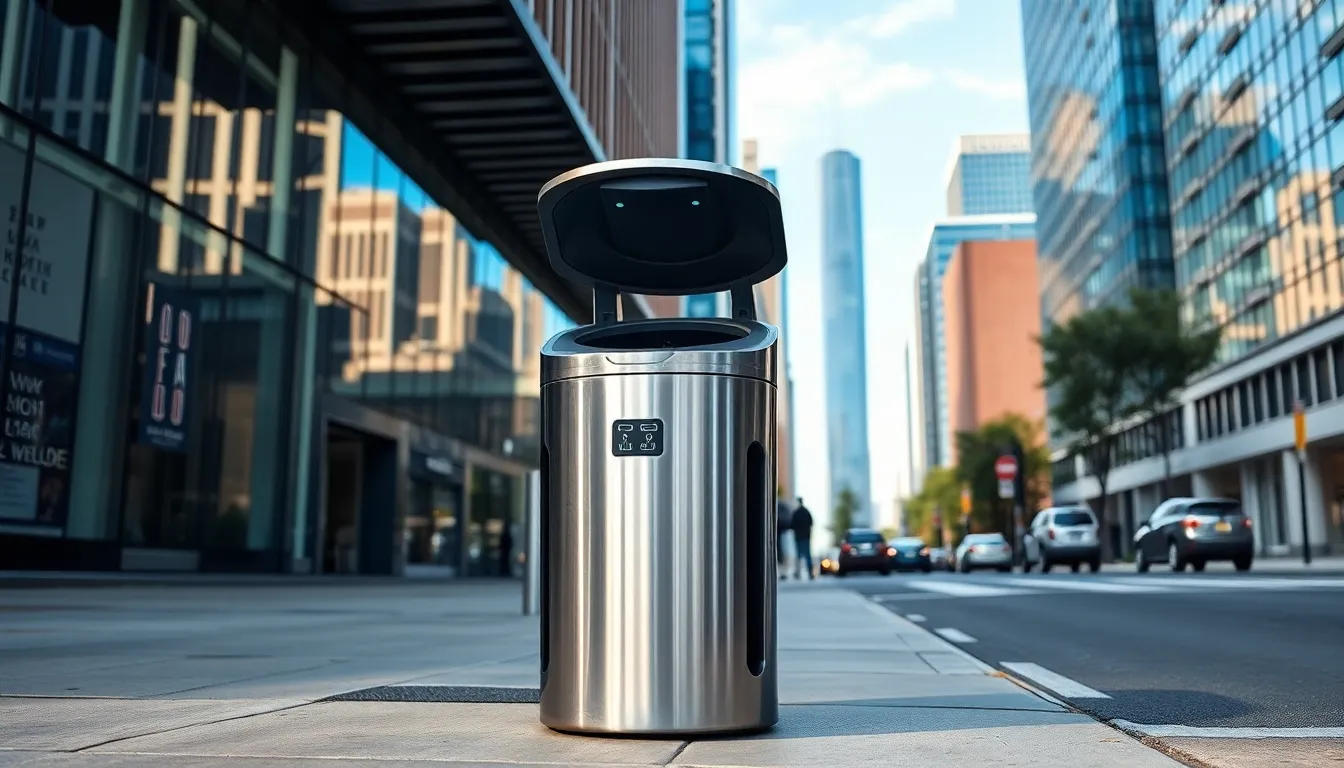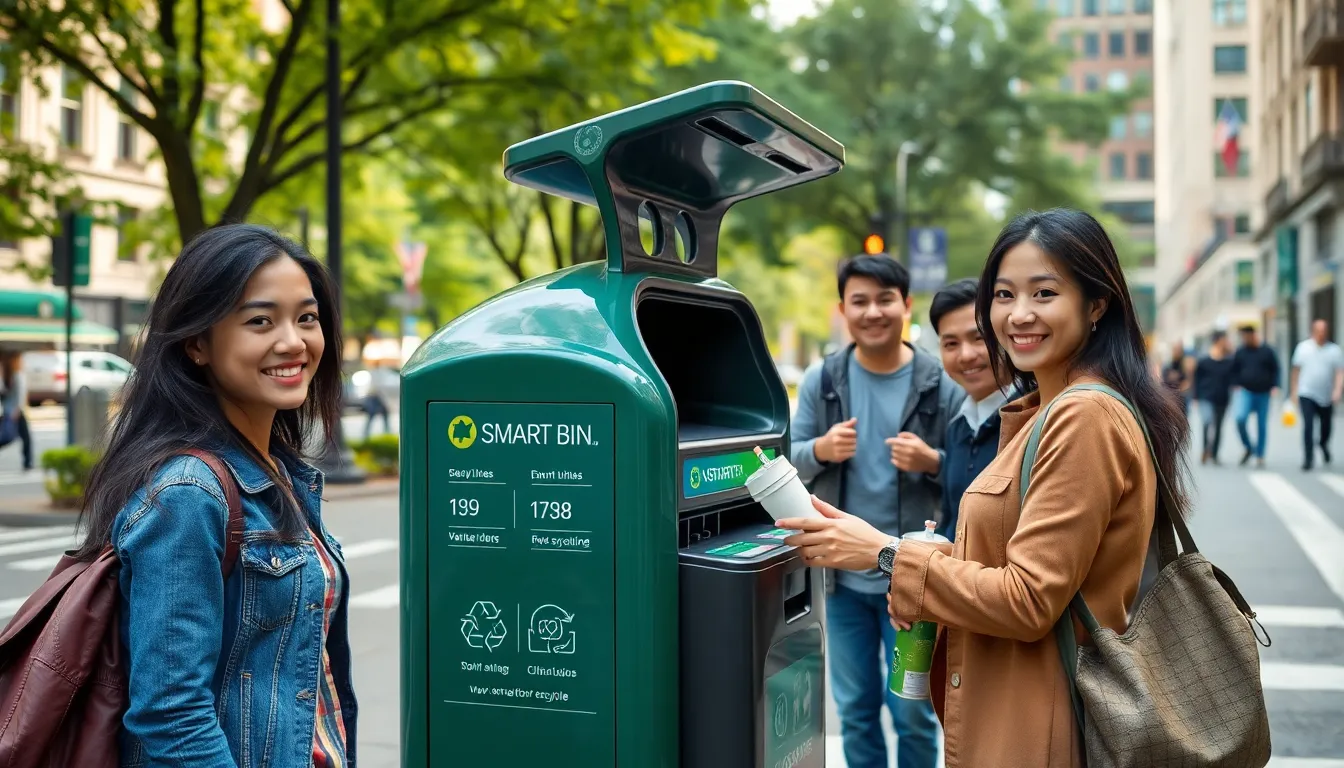Imagine a world where smart bins do the heavy lifting, literally. With the Internet of Things (IoT) revolutionizing waste management, trash disposal is no longer a dirty job left to the brave souls in jumpsuits. Instead, it’s a high-tech operation that keeps cities cleaner and greener while saving time and resources.
IoT devices can monitor waste levels in real-time, optimizing collection routes and reducing fuel consumption. It’s like having a personal assistant for your garbage—who knew your trash could be so well-organized? As cities embrace this innovative technology, they’re not just managing waste; they’re paving the way for a sustainable future. So, let’s dive into how IoT is transforming waste management from a mundane chore into an efficient, eco-friendly marvel.
Table of Contents
ToggleOverview of IoT for Waste Management
IoT transforms waste management by improving operational efficiency and enhancing urban sustainability. Smart bins represent a significant innovation, equipped with sensors that monitor waste levels in real time. These bins relay data to waste management systems, allowing for optimized collection schedules and routes. As a result, this technology minimizes unnecessary trips, which leads to reduced fuel consumption and lower operational costs.
Implementing IoT in waste management also increases transparency and accountability. Real-time data access helps municipalities and waste management companies track their performance metrics. Analyzing this data enables continuous improvement in waste collection strategies.
In addition, smart waste management systems contribute to recycling efforts. Sensors can identify recyclable materials and separate them from general waste, encouraging increased recycling rates. Communities benefit from accurate data, guiding them in making informed decisions about waste disposal and recycling initiatives.
Furthermore, adopting IoT technologies fosters citizen engagement. Residents receive updates about collection schedules, missed pickups, or local recycling events through apps and notifications. As a result, community involvement in waste management increases, promoting sustainable practices.
Investing in IoT solutions for waste management offers long-term benefits. Data-driven insights lead to better resource allocation and investment in infrastructure. The potential for smart technologies to contribute to circular economies and improved sustainability in urban areas remains substantial.
These advancements highlight how IoT not only revolutionizes waste disposal but also supports broader goals of sustainability and environmental responsibility, aligning with the need for cleaner, more efficient cities.
Benefits of IoT in Waste Management

IoT transforms waste management by enhancing efficiency and enabling real-time insights into operations.
Improved Efficiency
Optimized routes and schedules lead to significant reductions in fuel consumption. Smart bins transmit data on waste levels, allowing for tailored collection plans. Labor costs decrease as less manual labor is necessary. Reduced trips not only streamline operations but also lessen environmental impact. Increased efficiency reflects positively on municipalities and waste management companies. Stakeholders can allocate resources smarter and achieve greater results with fewer resources.
Real-Time Data Monitoring
Continuous data tracking empowers swift decision-making in waste management. Sensors collect information on waste levels and send it to the monitoring system instantly. This real-time overview enables timely responses to changing waste patterns. Effective monitoring identifies full bins and potential overflow issues before they escalate. As a result, waste management becomes proactive rather than reactive. Enhanced data visibility cultivates accountability and transparency between service providers and local authorities. Properly utilized data can even improve overall waste reduction strategies.
Applications of IoT for Waste Management
The Internet of Things provides innovative solutions for waste management, enhancing both efficiency and sustainability through various applications.
Smart Bins and Sensors
Smart bins equipped with sensors monitor waste levels and provide real-time data about fill rates. These features allow for efficient routing of waste collection vehicles. Cities can minimize overflow situations, thereby decreasing the likelihood of litter and associated health risks. Trash bins also analyze the types of waste deposited, helping in distinguishing recyclables from general refuse. This capability promotes recycling initiatives and encourages responsible waste disposal among residents. Additionally, monitoring sensors offer insights that guide the deployment of more strategic waste management solutions.
Waste Collection Optimization
Waste collection optimization significantly improves operational processes in urban environments. IoT technology facilitates data-driven decisions in scheduling pickup times, reducing unnecessary trips. Collection routes can adjust dynamically according to actual waste levels, leading to fuel savings of up to 30%. Aided by real-time updates, waste management companies prevent overloading and shortages during peak collection periods. Digital dashboards provide municipalities with actionable metrics to enhance overall waste strategies. With continuous tracking of collection efficiency, cities can respond proactively to varying waste patterns, ensuring a cleaner urban landscape.
Challenges in Implementing IoT for Waste Management
Implementing IoT in waste management presents several challenges that municipalities and waste management companies face.
Data Privacy Concerns
Data privacy poses a notable challenge in the integration of IoT solutions. Users’ location data and waste disposal habits can be sensitive information. Ensuring the protection of this data is crucial for maintaining public trust. Compliance with regulations, such as the General Data Protection Regulation (GDPR), remains essential for organizations. Furthermore, data breaches could lead to severe repercussions, both legally and in terms of reputational damage. Striking a balance between data utilization for operational efficiency and safeguarding personal information is critical in developing an effective IoT framework.
Infrastructure Limitations
Infrastructure limitations hinder the effective deployment of IoT technologies. Many municipalities lack the necessary digital infrastructure to support smart waste management systems. Insufficient internet connectivity in rural or underserved areas presents a barrier to real-time data sharing. Inadequate funding can restrict the ability to upgrade existing systems or implement new technologies. Funding shortages may also stall projects aimed at integrating IoT devices into waste management practices. Addressing these infrastructure challenges is vital for seamless integration and optimal performance of IoT solutions.
Future Trends in IoT for Waste Management
Emerging technologies will reshape waste management through IoT advancements. Smart bins equipped with advanced sensors will become standard in urban environments, allowing for precise waste tracking. Real-time data sharing will facilitate immediate updates on waste levels. Enhanced algorithms will optimize collection routes, resulting in reduced operational costs and fuel savings.
Cities will adopt AI integration into waste management systems. Artificial intelligence will analyze data from smart bins, predicting waste generation patterns. These predictions will help municipalities plan collection schedules more effectively. Furthermore, AI will assist in improving recycling rates by identifying recyclable materials.
Increased citizen engagement will gain importance in waste management practices. Mobile applications will provide residents with real-time information on collection schedules and recycling events. Enhanced communication tools will encourage communities to actively participate in sustainability initiatives. Expanded education programs will focus on responsible waste disposal, fostering a culture of environmental responsibility.
Data privacy concerns will drive the development of secure IoT applications. Stronger encryption methods will protect users’ location data while maintaining compliance with regulations like GDPR. Continued collaboration among stakeholders will address infrastructure limitations, especially in rural areas.
Lastly, the integration of IoT with other smart city initiatives will create a holistic approach to urban sustainability. This interconnectedness will lead to smarter resource allocation and infrastructure planning. Collectively, these trends highlight how IoT will transform waste management systems and contribute to cleaner, more efficient urban landscapes.
The integration of IoT in waste management represents a significant leap toward smarter and more sustainable urban environments. By leveraging real-time data and advanced analytics, municipalities can optimize waste collection, reduce operational costs, and enhance recycling efforts.
This technology not only improves efficiency but also fosters community engagement and accountability, making residents active participants in sustainability initiatives. As the challenges of data privacy and infrastructure limitations are addressed, the potential for IoT to revolutionize waste management will continue to grow.
Ultimately, embracing these innovations is essential for creating cleaner, more efficient cities that prioritize environmental responsibility and resource optimization.

